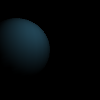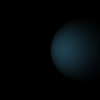spot_light()#
Adds a spot light.
Examples#

def setup():
py5.size(100, 100, py5.P3D)
py5.background(0)
py5.no_stroke()
py5.spot_light(51, 102, 126, 80, 20, 40, -1, 0, 0, py5.PI/2, 2)
py5.translate(20, 50, 0)
py5.sphere(30)

def setup():
py5.size(100, 100, py5.P3D)
concentration = 600 # try 1 -> 10000
py5.background(0)
py5.no_stroke()
py5.spot_light(51, 102, 126, 50, 50, 400,
0, 0, -1, py5.PI/16, concentration)
py5.translate(80, 50, 0)
py5.sphere(30)
Description#
Adds a spot light. Lights need to be included in the draw() to remain persistent in a looping program. Placing them in the setup() of a looping program will cause them to only have an effect the first time through the loop. The v1, v2, and v3 parameters are interpreted as either RGB or HSB values, depending on the current color mode. The x, y, and z parameters specify the position of the light and nx, ny, nz specify the direction of light. The angle parameter affects angle of the spotlight cone, while concentration sets the bias of light focusing toward the center of that cone.
Underlying Processing method: spotLight
Signatures#
spot_light(
v1: float, # red or hue value (depending on current color mode)
v2: float, # green or saturation value (depending on current color mode)
v3: float, # blue or brightness value (depending on current color mode)
x: float, # x-coordinate of the light
y: float, # y-coordinate of the light
z: float, # z-coordinate of the light
nx: float, # direction along the x axis
ny: float, # direction along the y axis
nz: float, # direction along the z axis
angle: float, # angle of the spotlight cone
concentration: float, # exponent determining the center bias of the cone
/,
) -> None
Updated on March 06, 2023 02:49:26am UTC
